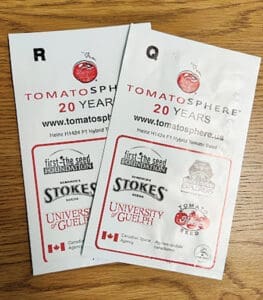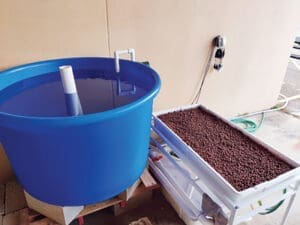By Erin Lang
Science has always been a focus of Surfside Middle School. From our outstanding pre-engineering program to wet week at the Gulf and Bay Day in St. Andrews Bay, Surfside makes every effort to bring science to life for our students.
 There are a few new projects taking shape this year. We were lucky enough to receive a grant from the Florida Department of Agriculture and Consumer Sciences for a full-sized aquaponics system for our students to operate as part of the Agriculture program. Aquaponics is growing in popularity throughout the world, and there are more and more career opportunities in the field every single year. This style of farming allows the farmer to grow fish and plants together in a much smaller space, utilizing far less water than traditional farming. Our system at Surfside includes a 250 gallon fish tank and space to grow over 100 plants.
There are a few new projects taking shape this year. We were lucky enough to receive a grant from the Florida Department of Agriculture and Consumer Sciences for a full-sized aquaponics system for our students to operate as part of the Agriculture program. Aquaponics is growing in popularity throughout the world, and there are more and more career opportunities in the field every single year. This style of farming allows the farmer to grow fish and plants together in a much smaller space, utilizing far less water than traditional farming. Our system at Surfside includes a 250 gallon fish tank and space to grow over 100 plants.
 We are planning on raising catfish as we grow a variety of plants including lettuce, basil, and tomatoes. However, these are not just your everyday tomatoes. As a way to connect this to the real world of science, we are going to grow tomatoes from seeds that spent 30 days aboard the International Space Station. As part of the Tomatosphere project, students will grow tomatoes from two sets of seeds. One set has been to space, and the other has not. The goal is to see if there is any difference between the tomatoes that have been to space and those that have not. One day, humans may need to be able to grow their own food in space, and this is a tiny step in collecting real data to figure out if this is possible. We won’t know which seeds are the “space tomatoes” and which are not until we submit the data to the project leaders.
We are planning on raising catfish as we grow a variety of plants including lettuce, basil, and tomatoes. However, these are not just your everyday tomatoes. As a way to connect this to the real world of science, we are going to grow tomatoes from seeds that spent 30 days aboard the International Space Station. As part of the Tomatosphere project, students will grow tomatoes from two sets of seeds. One set has been to space, and the other has not. The goal is to see if there is any difference between the tomatoes that have been to space and those that have not. One day, humans may need to be able to grow their own food in space, and this is a tiny step in collecting real data to figure out if this is possible. We won’t know which seeds are the “space tomatoes” and which are not until we submit the data to the project leaders.
This brings us back to the aquaponics system. If in the future, humans on a space station or another planet have to grow food, they will likely have limited space. Our research in the classroom will provide data to scientists exploring the possibilities of utilizing aquaponics systems for growing food in space.
For many students, this is the first time that they have ever thought about where their food comes from. As our world changes, the way that we grow and distribute our food is changing. We need to be able to grow more food using less and less space. Aquaponics is showing itself to be a viable solution to this.
Studies show that middle school is the time when students “decide” if they are going to take an interest in science and possibly pursue it as a career. This is why we are so passionate about science at Surfside. The main goal of the Agriculture program is for students to have both an appreciation for the food they eat and perhaps spark an interest that could turn into a career.























































